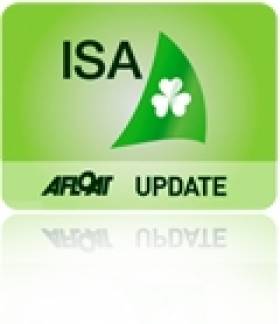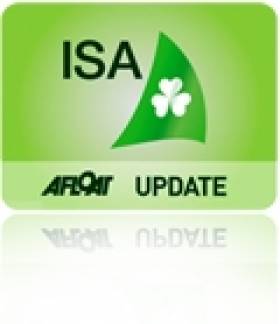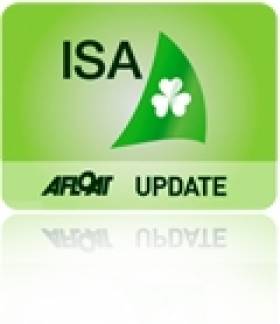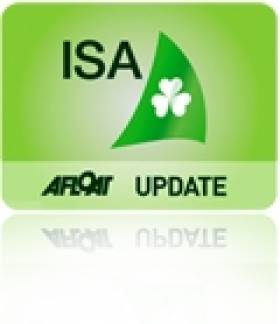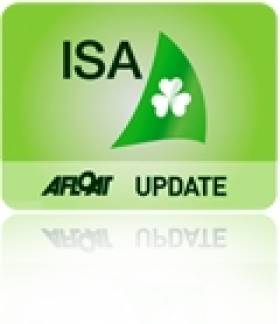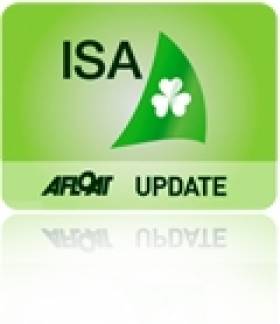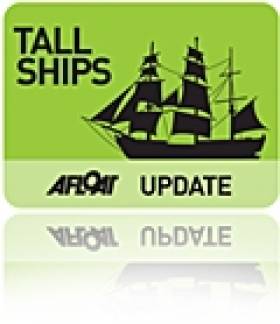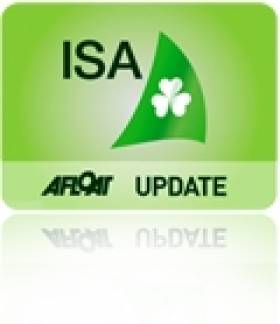Displaying items by tag: Irish Sailing Association
ISA Strategic Review Report Heralds Big Changes Ahead
#ISA - They promised a shake-up – and with the release of an independent review of the state of the Irish Sailing Association (ISA), there are indeed some big changes on the way for sailing's national representative body.
Last November Afloat.ie reported on the appointment of a Strategic Review Group (SRG) to point the way towards a new direction for the ISA, after months of discussions and doomsaying over the state of sailing in Ireland for all bar the 'elite' high-performance athletes.
(The full SRG report and an introduction from new ISA President David Lovegrove are downloadable below as PDF documents).
It's more than a year now since former ISA president Roger Bannon provided his poor assessment of Irish sailing's health, claiming that its figurehead organisation "has lost its way over the past few years" as a bureaucracy "detached from the reality of what is going on in the front line."
That reality - beyond the obvious successes on the international stage for Olympic stars like Annalise Murphy - is a crisis of dwindling interest in sailing nationwide as membership rates fall, and a lack of confidence in the ISA's support for leisure sailing, especially within the more accessible, lower-cost dinghy classes.
It prompted the likes of sportboat sailor Ric Morris, sail trainer David Harte and former Irish Olympics sailing chief Richard Burrows to chime in with their own individual takes on the state of play, painting a picture of a sailing community that needs to pull out all the stops to ensure the next generations of sailors are not discouraged from getting afloat, whatever their level of skill or interest.
The National Yacht Club Forum in March 2013 heard of stormy waters for Irish sailing - a situation that the ISA board responded to the following month with its recommendations for preserving the future of small boat classes. That in turn led to further debate and suggestions on what the ISA could do to rejuvenate sailing outside of the performance ranks.
Looking at the stats as they stood last year, which make clear there's been a significant drop-off at the novice level, Bannon was left to conclude that "competitive small boat sailing in Ireland is clearly on its knees".
But as we reported on Afloat.ie in November last year, it's not all doom and gloom for Irish dinghy sailing, and the subsequent appointment of the SRG by the association - and making a point of including such dissenting voices as Roger Bannon in its ranks - showed the ISA's commitment to finding a new way forward.
As the SRG's review got underway, the ISA also found itself a new president in erstwhile Howth Yacht Club commodore David Lovegrove, whose tenure began earlier this month, and followed through on a New Year's resolution to wipe the slate clean and shake up the board, making room for Bannon and other members of the independent review group.
That brings us right up to date with the SRG's report, heard earlier this month by the ISA Board and released today, which doesn't pull its punches in acknowledging the "disenchantment and frustration" felt by a majority of the ISA's grassroots with the current situation.
Following a series of what Lovegrove describes as "open and frank" discussions with Ireland's sailing clubs, the SRG in its executive summary identified "a number of fundamental organisational issues at the root of the disconnection" between the ISA and its members.
Generally speaking, there is a view that the public perception of sailing in Ireland could be a lot better, with a number of barriers to entry that need to be addressed, and that the ISA's role as the sport's governing body is unclear and poorly communicated, exacerbated by a fragmented approach to organisation.
What the SRG identifies is the need for the ISA Board to "assert its authority" over the executive to ensure members needs are met and for its professional staff "to be more responsive to the relationship between the ISA and those directly involved in the sport - at various levels."
Importantly, the SRG says the ISA "needs to create a culture that encourages participation", and can do this by harnessing the goodwill, "experience and energy of volunteers" across Ireland's clubs. Rebuilding that relationship between the association and its members is also key to delivering value for money.
The SRG review proposes that the role and operation of the ISA board be changed, firstly with the creation of an executive committee and new policy groups, replacing the current advisory groups, to advise the board and "harness expertise from outside the board".
As well as a recommendation that the ISA's 2020 Vision be replaced with a detailed '4-Year Strategic Plan' focussing on the priorities identified by members, it's also proposed that the board meets with club officers individually on at least a biennial basis to overcome the "disconnect" between the ISA and its members.
Among the executive committee's responsibilities will be addressing weaknesses within the budgetary process to ensure that members feel their contributions will benefit all.
Meanwhile, among the policy groups will be one dedicated to changing the relationship between sailing and the public sector, involving more voices from the sailing community in the State funding process.
In terms of training, another policy group will develop new structures and supports for Ireland's clubs and training centres recognising the different needs at various levels, with a view towards encouraging younger talent from the ground up.
That's also the aim of the Participation & Access Policy Group, which will explore getting schools' sailing recognised as a PE activity in the new Junior Cert syllabus. And the Olympic & High Performance Policy Group will, among other things, be tasked with scouting for new talent outside of Pathway Class events.
The Racing Policy Group aims for mutual support across Ireland's classes in developing a national and regional sailing calendar to avoid clashes and encourage joint events wherever appropriate. And leisure sailing will be the focus of its own policy group, a reminder to the ISA that a large part of its membership are not involved in racing.
On the communications front, another policy group will look at how best the association can market its efforts within its membership and the public at large.
On Wednesday 9 April the ISA Board will meet again to approve the make-up of these policy groups, which will on to prepare their individual inputs to a holistic strategic plan to set out changes for the ISA ongoing.
It's expected that a final draft, after consultation with key stakeholders, will be published this summer, accompanied by a series of regional meetings to explain the plan - and most importantly, what it means for clubs and individual members.
The SRG report and David Lovegrove's introduction are available to download below, and we would love to hear what you make of it. Let us know in the comments below.
New ISA Board to Shake–Up Irish Sailing
#irishsailing – After a year of protest over its policies the new board of the Irish Sailing Association (ISA) is to hear plans for a shake–up of the association aimed at reversing the decline in participating numbers.
Incoming Irish Sailing Association (ISA) president David Lovegrove's first job will be to hear the in-depth report on the state of the association at its first board meeting in ten days time. Major change is on the cards, according to insiders, who say the ISA is about to get a long over due shake–up thanks to the work of the association's Strategic Review Group (SRG) established last November.
At last weekend's agm, Lovegrove heard from ICRA commodore Norbert Reilly who was the latest sailor to spell out just some of his frustrations. Reilly, who can lay claim to nearly half of the ISA membership through his cruiser–racer ranks, has demanded a bigger share of available resources.
'ICRA represents up to 7,000 sailors on cruiser racer boats, many of whom contribute a serious amount of money to the ISA via the capitation fee from their individual clubs, and these sailors want a fair share of these funds spent on areas where they can participate and benefit', Reilly told Afloat.ie
How Sports Council funding and ISA club affiliation funds are spent is at the heart of the matter. For over a year critics of current policy say there is an 'over-emphasis of the training of selected juveniles by the creation of elite squads of possible future Olympians'.
As ISA membership numbers drop by a quarter, clubs and classes have vented their anger with the organisation. It began last year online at Afloat.ie and manifest itself as a motion for change at last year's agm by dinghy sailors Norman Lee and Bryan Armstrong. Since then the association received over 300 proposals at a testy dinghy forum at the National Yacht Club in March 2013.
'I want a full shake-up. Lets take the focus off the Olympics and have a root and branch reappraisal of sail training' Lee told the ISA.
By July, the board was confronted by three former association presidents at a specially convened meeting at the Royal Marine Hotel in Dun Laoghaire who demanded a new plan for Irish sailing.
By November, then president Niamh McCutcheon announced an independent group of sailors would lead a review of the association. In framing the terms of reference for the SRG McCutcheon conceded 'events have overtaken it and the ISA needs a new plan'.
Since then the SRG with the full backing of the club network has been working on 'a review of current practices' which it is understood will get its first airing at the ISA board room on March 20th. One of the big areas to be looked at is where funding is being spent.
In round terms, the association turns over €2m per annum. €1m is ring fenced for Olympic team endeavours. Another €1m provided by clubs and other state grants that say critics is largely eaten up by bureaucracy. The association currently employs 14 staff. Its accounts show a €769,519 payroll for the 14 months to December 2013.
Meanwhile, SRG chair Brian Craig, has left no stone unturned in speaking with clubs and individuals round the country about how the ISA should be entirely focussed on its original purpose of serving member clubs. It is understood this will be central to the SRG's new plan.
Incoming treasurer Roger Bannon, a former president, has also not minced his words in the past on the subject, consistently arguing for change.
Significantly, Craig has included Bannon, an outspoken critic of current ISA policies in the SRG line–up. A dinghy and sportsboat champion in his own right, Bannon used his term in office two decades ago to secure the position and financial viability of the association as a national sporting authority by making every member of a sailing club in Ireland also a member of the ISA.
It was a bravo move that unified Ireland's sailing clubs into a stronger whole fit to nurture the talent necessary to challenge the world at the top levels of sailing. But in more recent times that fitness has been called into question, and Bannon is among those who hit out at an authority that has arguably lost its relevance to all bar those at the most elite levels in the sport.
In a call for change on Afloat.ie a year ago, "The ISA has lost its way over the last few years," Bannon said, giving his view of a bureaucracy "detached from the reality of what is going on in the front line".
Craig has also asked another former president Neil Murphy, along with Olympic race officer Jack Roy, sailmaker Des McWilliam and small boat advocate Bryan Armstrong to join this Group, with the option to add others as the process continues.
Now its 'initial examination' of the ISA is completed the SRG will move on to recommend 'future strategies' in just over a week's time.
Board Shake Up for Irish Sailing Association
The Irish Sailing Association's (ISA) Annual General Meeting on March 1 will see a shake up in the board of the national governing body with the retiral of its president and two other directors to be replaced by members of the recently formed Strategic Review Group (SRG). It's all part of a drive to stem the decline in sailing that has seen membership at some of the country's biggest clubs drop by some 30% amid concern over current association policies.
David Lovegrove from Howth Yacht Club is standing for the office of President and significantly two senior SRG members that have been looking into the operation of how the association performs are set to join the board. SRG Chairman Brian Craig and a former President of the ISA, Roger Bannon are standing for election. Both men are widely credited with achieving success for the sport in the past, Craig with the staging of some top international events and Bannon with the reformation of the ISA itself, more than a decade ago. Bannon previously cited cost as the elephant in the room for sailing.
Agreement from the board of the Irish Sailing Association (ISA) in November to allow a full independent review of how it operates was a good start to overhaul a sport facing declining numbers.
Ironically, the review came after a period where Irish sailing sought to punch above its weight, playing host to all sorts of European and world championships in the 2012 and 2013 period, all of which relied heavily on a mix of State and commercial support.
The Irish Sports Council spent €1.25 million on sailing in 2012, including €400,000 on a fleet of dinghies and new support vehicles for the ISA.
It was a support that prompted the ISA chief executive Harry Hermon to declare 2012 as a "breakthrough year" for Irish sailing. But it appears such international events are no barometer of the national scene. In fact, they came at a time when many Irish clubs are facing financial headwinds with unsustainable overheads. More on this by David O'Brien in the Irish Times here.
According to the ISA, larger clubs have lost 30 per cent of their members over the last five years, resulting in a combined drop in ISA club memberships of 24 per cent.
Three existing directors are due to retire including the president Niamh McCutcheon.
The agm will be held at 1600hrs on 1st March 2014 at the Royal Marine Hotel, Dun Laoghaire.
Included in the agenda for the agm is a report from the SRG.
In the election of directors, the official agm notice says Oliver Hart having served seven years on the Board is retiring in accordance with Article 68. Berchmans Gannon is also retiring by rotation in accordance with articles 73 & 74. He is not going forward for re-election.
'Independent Group' of Sailors to Form Future Irish Sailing Association Plan
#ISAPLAN – The Irish Sailing Association (ISA) is set for a shake–up following a year of controversy over its policies. Last night it was revealed an 'independent group' – that includes some of the association's critics – has been appointed to form a new plan for the governing body.
In framing the terms of reference for the 'Strategic Review Group' (SRG), ISA President Niamh McCutcheon conceded 'events have overtaken it and the ISA needs a new plan'.
A team of six leading sailors will 'establish the policies to be pursued and the actions required to deliver them successfully', according to SRG chairman Brian Craig, a former flag officer of the Royal St George Yacht Club in Dun Laoghaire.
Some long standing grievances aired last winter led to revolt when sailors Norman Lee and Bryan Armstrong criticised its dinghy and small boat training at the ISA agm. The points raised received widespread support that manifested itself months later in a vocal 'dinghy conference' for Ireland's 20 small boat classes at the National Yacht Club, resulting in over 300 suggestions for change.
It took perseverance and genuine courage to press for this change and there will be many sceptics and spoiling interests to confront if this first step is to translate into a new blueprint for sailing but in forming the new group, Craig has stressed its impartiality: 'As an independent group, we are ideally placed to seek suggestions".
We want to hear from anyone with a view to offer and I assure you that we will listen', he vowed.
Headquartered in Dun Laoghaire, the ISA has a staff of 14. Its accounts for 2012 show a turnover of €2m, much of it made up of government grants.
Significantly, Craig has included former ISA President Roger Bannon, an outspoken critic of current ISA policies in the line–up. A dinghy and sportsboat champion in his own right, Bannon used his term in office two decades ago to secure the position and financial viability of the association as a national sporting authority by making every member of a sailing club in Ireland also a member of the ISA.
It was a bravo move that unified Ireland's sailing clubs into a stronger whole fit to nurture the talent necessary to challenge the world at the top levels of sailing. But in more recent times that fitness has been called into question, and Bannon is among those who hit out at an authority that has arguably lost its relevance to all bar those at the most elite levels in the sport.
In a call for change on Afloat.ie last March, "The ISA has lost its way over the last few years," Bannon said, giving his view of a bureaucracy "detached from the reality of what is going on in the front line".
Craig has also asked another former president Neil Murphy, along with Olympic race officer Jack Roy, sailmaker Des McWilliam and small boat advocate Bryan Armstrong to join this Group, with the option to add others as the process continues.
Once it has carried out an 'initial examination' the group will move on to recommend 'future strategies'.
Spring 2014 is scheduled as completion date for the Group's assessment of the current position.
'This will be a major undertaking but I am confident that, with the support and engagement of all interested parties, we will chart a course for the Sport suited to this new environment.
It is understood the process will include a zero based budget review on key financial areas along with a review of the association's committee structures.
'The new plan will be critical to the association's ability to provide leadership in satisfying the aspirations of existing members and in attracting new participants to the sport', according to McCutcheon, the outgoing president due to step down in March.
The SRG has set up a dedicated email address and can be contacted by email through [email protected]
In a statement seen by Afloat.ie SRG Members are listed with the following bios as:
Bryan Armstrong lives at Rosses Point County Sligo. Keen if not overly successful dinghy sailor since the late 1960s with an interest in home boatbuilding in wood – Mirrors, GP14 and (for the 2011 Worlds in Sligo), a Fireball.
Committee member of Sligo Yacht Club several times over the years and Commodore 1978. Chaired organising group for 2006 GP14 Worlds in Sligo which was intrinsically linked with the construction of the new Sligo clubhouse. Always interested in junior sailing in Sligo and nationally. Committee member Irish Mirror Class Association 2004 to 2011 and President 2008 to 2010. Currently actively sailing a GP14. Practicing partner solicitor in a Sligo based firm. Bryan can be contacted at [email protected]
Roger Bannon, a member of the National Yacht Club, was President of the Irish Sailing Association when the Joint membership Scheme was established and the current Olympic /Elite model was devised in the mid 90's. He has always been a keen small boat sailor and has won multiple national titles in the 420, Mermaid, Flying Fifteen and J24 classes. He was the first Irish sailor to pioneer racing in the Olympic Star Class and more recently was one of the innovators in the establishment of the SB20 fleet in Ireland. He continues to have an active interest in the sport and still regularly sails his venerable 53 year old Mermaid "Endeavour" and when creaking bones allow, occasionally a J70 or a National 18. Roger can be contacted at [email protected]
Brian Craig, a former flag officer of the Royal St George, a member of the Irish Cruising Club, Lough Derg and Kinsale yacht clubs. Was a keen dinghy sailor competing on the Firefly, Fireball and Team Racing national and international circuits. Currently racing a SOD, he has a motor cruiser on Lough Derg and a cruising yacht based in Dun Laoghaire.
Since retiring from business, he has played a key role in attracting and organising major championships on Dublin Bay. He worked closely with the waterfront clubs and local bodies in Dun Laoghaire to develop the biennial Volvo Dun Laoghaire Regatta and more recently led the Irish team that ran the ISAF Youth Worlds 2012.
He was a recipient of the 2010 National Award to Volunteers in Irish Sport from the Irish Sports Council. Brian can be contacted at [email protected]
Des McWilliam (Royal Cork Yacht Club and Royal Irish Yacht Club)
A regular participant in Irish and international sailing. He is in constant contact with customers in dinghy and keelboat sailing - racing and cruising.
Des Sailed for Ireland: Admiral's Cup on five occasions, Sardinia Cup twice, the Southern Cross and 1/2 Ton Cup twice. He is the owner of McWilliam Sailmakers Ltd / UK Sailmakers Ireland and President of 50-loft UK Sailmakers International Group 2010-12. Co-owner UK Sailmakers International Group 2012-present and was a member of the Oireachtas Task Force on Small Business in mid '90's He was a guest lecturer in Entrepreneurship UCC late '90's and is still in business after five years of recession. Des can be contacted at [email protected]
Neil Murphy (Howth Yacht Club and Malahide Yacht Club)
Enterprise dinghies and Laser frostbiting (when wet suits were a novelty) were Neil's intro to the sport. Small boats are still his favourites and he races a Puppeteer 22 in Howth. As a National Race Officer, he gets to see and enjoy racing in a variety of Classes.
As one of the ISA's youngest Presidents (1996 to 1998), he launched its first Strategic Plan, which plotted priorities and set out its targets coming into the current millennium. He chaired the 2012 ISA review of the All Ireland (formerly Helmsmans) Championship and, most recently, was Race Officer when Howth YC hosted the 2013 event. Apart from racing, his main area of interest is in increasing participation levels, both by recruiting newcomers and retaining those already involved.
Neil can be contacted at [email protected]
Jack Roy (National Yacht Club, Royal Irish Yacht Club and Kinsale Yacht Club)
Started sailing Mirrors in 1967 from Greystones Sailing Club. Over the years he has raced in 420s, 470s, Flying Fifteens, J24s, Dragons, J109s and Squibs. He has also cruised for many years and currently keeps a cruising boat in Kinsale from where he sails the southwest coast and further afield. When Jack's not sailing he's very involved in race management and has been an International Race Officer since 1998. He was honoured to be the first Irish Race Officer at an Olympic Regatta in the London 2012 Games. Jack Roy is a cuurent board member of the ISA.
When not on the water, he is Managing Director of Fagerhult Irl Ltd, the Dublin office of a Swedish PLC specialising in energy efficient lighting solutions to the commercial sector
Jack can be contacted at [email protected]
For further reading:
ISA Defers Dinghy Sailing Meeting at National Yacht Club
#dinghy – The Irish Sailing Association (ISA) has deferred its important conference on small boat sailing at the 11th hour. Scheduled for this Saturday the 'Dinghy & One Design keel-boat Convention' was due to examine problems in the sport will not now tkae place til November 30.
Citing the unavoidable absence of some key representatives the Advisory Group, the ISA says it has taken a decision to defer the meeting until the 30th of November.
As recently as this week a former ISA president wiritng on Afloat.ie set out the big task ahead to put small boat sailing back on an even keel. Roger Bannon gathered two years of championship information to put before the meeting but drew the conclusion that the 'scope of the task was awesome'.
This month's meeting follows a higly charged 'classes forum' held last March which produced over 300 suggestions for change in the way the ISA handles small boat sailing.
That meeting also prompted Ric Morris' suggestions for five things the ISA could do to rejuvenate dinghy sailing in Ireland. His salient points will surely provide much fodder for discussion on the day.
Cost is the 'Elephant in the Room' for Irish Small Boat Sailing
#smallboatconference – Ric Morris's excellent five point analysis goes some way to identifying the direction in which we should be taking small boat sailing in Ireland writes Roger Bannon.
Perhaps one of the problems we have is that none of the so called adult classes, where most racing is occurring, have sufficient critical mass with maybe the Laser class being somewhat of an exception. Very few classes attract more than 25 boats to participate in events and this tends to encourage a parochial ethos with little interface between different classes. There has to be a strong case for classes to collaborate on hosting events, particularly regional and national championships. This would help to reduce costs, improve race management standards and enhance the enjoyment of onshore activities with the improved dynamic of increased numbers. It would also provide a showcase for individual classes to highlight their attractions. Most young people entering the sport have little awareness of the enjoyment, both social and sailing, to be derived from the established older style fleets such as the Squibs, National 18s, Mermaids, GP14s, Shannon One designs, Flying Fifteens, etc. It is worthwhile noting that the team which won the Mermaid Championships this year were all under 23 years of age! The Fireball and SB20 fleets provide great opportunities for youngsters to participate in exciting boats with good fleet sizes and highly competitive racing without any great financial commitment as boat owners are always looking for fit young crew. The "cradle to grave" RS family of boats is probably a good indicator of where we should be going with multiple RS classes catering for all ages and abilities sharing resources to host events and creating the essential ingredients to make events enjoyable and cost effective.
The "elephant in the room" that seems to be ignored by many administrators in the sport is cost! How can an entry fee of €190 be justified for a child to participate for 3 days in the Optimist National Championships? Why do we wonder why participation levels at this event have fallen so dramatically? Why are new recruits to the sport brainwashed into acquiring expensive new boats when so many acceptable second hand boats are lying idle in garages and sheds around the country and readily available in the UK. The Mirror class believes there are literally hundreds of old Mirrors not being used in Ireland. Many of these may be less than ideally competitive, but who cares, if a couple of hundred additional young people are able to get regular fun sailing in them. Why is it so expensive to participate in club sponsored youth schemes and to acquire Instructor qualifications?
I think we need to re-examine how we attract and more essentially retain young people in the sport.
Does it really matter what type of boats our kids are sailing as long as we have loads of them enjoying the sport in a safe manner?
Can we revitalise the traditional linkages of prior years between youth sailors and the established classes and attract them to make the transition?
The ISA has pursued a policy of developing excellence in our youth sailors by encouraging them to sail in high performance or very competitive boats, plucking the best from these classes and then supporting them as elite sailors who we ultimately hope will achieve Olympic potential.
From the ISA's perspective, this is a worthy policy to pursue, as success at international and Olympic level raises the profile of the sport which provides the justification to source substantial funding from various Government Agencies, notably the Sports Council, to sustain the organisation. However this approach disillusions the vast majority of young sailors who are not of elite standard and there is no adequate policy or framework in place to encourage these young sailors to continue their relationship with the sport. An unforeseen consequence of this policy has been the focus on encouraging young sailors to use single handed boats such as the Laser and Optimist, almost to the exclusion of multi crewed alternatives. This has also had the impact of not equipping youngsters with the basic skills of sailing in a team environment, leaving them with little experience of the roles in multi crewed boats and lacking the versatility to enjoy other aspects of the sport. It should be noted that this is in direct contrast with the RYA's policy of nurturing and directly supporting inexpensive classes such as the Topper and Mirror. They do this for 3 main reasons, the first being that so many of their Olympic sailors have come from these classes, secondly they recognise the best sailors in a large fleet are likely to be more talented than those at the front of a smaller fleet and finally multi crewed boats with conventional spinnakers provide a good foundation level of skills to apply to higher performance boats.
There is perhaps another factor at work in the RYA which has contributed to their outstanding success at Olympic and youth levels. The RYA people directly involved in devising policy and managing development programs are almost all exclusively extremely talented sailors who have enjoyed considerable racing success themselves and understand the environment which encouraged and motivated them.
Returning to Ric's suggestions, I think what is outlined above lends weight to some of his proposals.
· Serious consideration should be given to the establishment of a new Small Boat Racing Association to oversee and determine policy for small boat racing activities (excluding Olympic and elite support) as the ISA is ill equipped with personnel of the appropriate experience to execute a role in this regard. The founders of ICRA (Irish Cruiser Racing Association) decided this was the way to go for big boat sailing some years ago and it has proven to be a tremendous success.
· The ISA should be in a position to collate and disseminate vital statistics about participation levels in the sport and provide information on the performance and throughput of its training schemes in the form of a reliable database.
· An urgent review of the ISA's training schemes is required to put a greater focus on producing sailors with a broader range of sailing skills (probably over a longer period) to equip them to safely enjoy other aspects of the sport.
· Existing established classes need to consider collaboration with other similar classes to create a more exciting, cost effective and better resourced dynamic within which to participate in competitive sailing.
Sports Minister Wants to Know How Grant Money is Spent
#budget – In a week that saw Sports Council Grants hit in the budget, it is still unlcear as to how this might affect Irish sailing, a sport that benefitted from a range of state support to the tune of €1.2 million in 2012.
Writing in today's Sunday Independent newspaper John Greene reminds that Sports Minister Leo Varadkar has said publicly three times in recent weeks that he wants to see how money is spent by Ireland's sports associations. Greene says it is thought there remains a level of dissatisfaction that some of the national governing bodies for sport remain rooted in old habits and are not providing value for money, a frustration shared by the sports council.
A statement from the Federation of Irish Sports (FIS) on behalf of Sport in Ireland said it was disappointed with the announcement which sees a further 8% reduction in current funding for Irish Sport with funding to the Irish Sports Council believed to be in the region of €40 million for next year – a reduction of approximately €3 million on 2013. This is the funding that enables over 100 Irish Sports organisations to run sports development programmes essential to delivering sporting opportunities to all, provide much needed support to grassroots clubs and volunteers as well as providing assistance to our international athletes.
This is the sixth year in a row for cuts – investment in sport already having fallen by some 25% – and now sees Irish Sport back to 2006 levels of support. This is particularly damaging given that consistent government investment in sport only commenced in a meaningful way in 1999 and broke the €30 million barrier for the first time in 2004.
Sports council grants are an an important funding component for the Irish Sailing Association. In 2013 affiliated clubs and organisations secured €251,719 and the ISA has recently sought further applications despite the 8% funding cut now signalled for 2014.
Government grants for sailing include olympic sailing, grants for hosting events and capital grants for clubs and associations.
In October 2012, Irish sailing got the biggest grant of all sports bodies for 'Mobile Training Fleets'. Minister of State for Tourism & Sport Michael Ring approved a grant of €400,000 for sailing, the biggest of all grants awarded to 22 national sports bodies to buy new equipment and boost participation in sports and improve performance.
The sailing grant which was 15% of the total payout was awarded for "mobile training fleets, transport vans, coach boats, coaching equipment, Olympic sailing equipment and training camp equipment (excluding eyewear)."
The Irish Sailing Association (ISA) says the funds were spent on coaching equipment including coach boats, vehicles and training equipment, Olympic sailing equipment including a fleet of 420's, Laser Radials and a 49er with associated spares for training camps and training camp equipment which includes strength and conditioning apparatus to be used on training camps.
The ISA also funded for four mobile training fleets for use on introductory ISA training programmes. The aim is to provide support for organisations looking to develop junior, schools and introductory adult programmes.
Four RNLI Lifeboats Rescue Crew From Sunken Tall Ship Astrid
#TallShips - Four RNLI lifeboats were involved in the rescue of 30 crew from the tall ship Astrid, which sank off the Cork coast earlier today (Wednesday 24 July).
The 42m Dutch training vessel reportedly hit rocks inside the Sovereign Islands at Ballymacus Point, near Kinsale.
All on board were brought to safety when the Kinsale lifeboat transferred the casualties from the sinking ship onto the Courtmacsherry RNLI lifeboat and a local vessel. They were then taken to Kinsale.
Both Kinsale and Courtmacsherry RNLI lifeboats were called out at 12 noon today to go to the immediate aid of the sail training vessel that had got into difficulties on the western entrance to Kinsale Harbour in Cork.
Ballycotton and Crosshaven RNLI were also launched, though the Kinsale RNLI lifeboat was first on scene. There was a 2m swell and winds were force five to six.
The training vessel had lost power and was apparently driven on to rocks by a strong southerly wind at the western entrance to Kinsale Harbour. The grounded vessel was taking on water and a crewmember from Kinsale RNLI was put onboard.
Eighteen of the casualties were taken off the Astrid by Kinsale RNLI lifeboat and transferred to Courtmacsherry lifeboa, before being brought to safety. The remaining 12 were put onto a liferaft deployed by the Astrid’s crew, which was towed to safety by the Kinsale lifeboat and picked up by a local vessel.
The people on board the liferaft were then taken to Kinsale harbour and assessed by medical teams.
Irish Coast Guard helicopters from Waterford and Shannon were also on scene along with ambulances and medical crews from Cork.
Speaking about the call-out, Courtmacsherry RNLI coxswain Sean O’Farrell said: “Everyone was very fortunate. I want to praise the quick thinking of the skipper and the crew from the Astrid. They kept calm and did everything we asked them to do. We were able to get them to safety quickly and a major tragedy was averted. To be able to recover 30 people safely was a great day for everyone involved.”
Meanwhile, the Irish Sailing Association has issued the following media statement on behalf of the tall ship Astrid:
Tall Ship Astrid was on a voyage from Southampton to Cherbourg calling in to Kinsale. On board were 23 trainees from France, Ireland, the Netherlands, UK and Spain. The crew were from Belgium and the captain, Pieter de Kam was from the Netherlands.
As the Astrid was leaving Oysterhaven, as part of The Gathering Cruise parade of sail to Kinsale, the vessel experienced engine failure. They notified a nearby RIB which was being helmed by Irish Sailing Association (ISA) CEO Harry Hermon.
The RIB attempted to take a line from Astrid. However, due to the onshore winds and swell this was not possible. Captain de Kam issued a May Day.
The ISA RIB and the yachts in The Gathering Cruise flotilla stood by until the RNLI arrived. There was a safe rescue of all 30 crew who were brought to Kinsale on board the yacht Spirit of Oysterhaven and the lifeboat. All crew were brought to Kinsale Yacht Club where they were provided with showers, food and dry clothing. They were all medically checked and are in good health.
Sail Training Ireland and Kinsale Yacht Club are working together to make arrangements for accommodation and for returning the crew to their homes.
Commenting on the rescue, Captain Pieter de Kam of the Tall Ship Astrid stated: “I would like to thank the lifeboat and the coastguard for the safe rescue of all my crew. We very much appreciate their outstanding work.”
Harry Hermon, CEO of the Irish Sailing Association, commented: “It is thanks to the rescue services that all crew were rescued quickly and safely without injury. I would also like to thank all the sailors from the Gathering Cruise who stood by Astrid providing support to the crew.
"Kinsale Yacht Club has also been fantastic providing food and clothing and helping Sail Training Ireland find accommodation for all the crew”.
Five Things The ISA Can Do To Rejuvenate Irish Dinghy Sailing
#isa – In the wake of today's ISA recommendations for small boat sailing, Ric Morris suggests his own and they include a rekindled dinghy racing association as one of five solutions to the decline in Irish small boat sailing:
1/ Form an Irish Dinghy Racing Association (IDRA)
Outside of direct government funding, including funding for the high performance program and associated HP youth pathway, the ISA is predominantly funded by what amounts to a flat rate tax on club membership. The good thing is that this secures enough funding and gravitas for the ISA to represent the sport at a legal and legislative level and it gives every member of a club automatic access to the benefits of ISA membership. The bad thing, from a dinghy perspective, is that it also means that ISA thinking is dominated by the 7–8 clubs whose size means their contribution is by far the greatest. These clubs also tend to be the clubs predominantly involved with keelboat and yacht racing.
With very few genuine national classes at present and problems accessing venues for classes with small, or even relatively healthy, fleets there is a lot to be gained from pooling resources. As seen with the recent addition of the Moth to some of the Fireball traveller events with suitable co-ordination events can be shared. The RS class is another example of how classes can combine to advantage, as historically have the Jack Holt boats.
A lot of what's needed could be done without the formation of an IDRA but a forum is clearly needed at least for the time being. I highlighted some of the good things going on above but it shouldn't be left to 'knowing someone who knows someone'. Don't get me wrong but the dinghy classes have a lot to prove in terms of working together. Some classes, ironically the ones left standing, don't have a great track record of working well with others. To take a place at the ISA table the dinghy classes, and the clubs whose primary activity is dinghy racing, need to combine and show that they are capable of putting forward a well-supported and co-ordinated agenda.
2/ Provide clearer guidance on the health of the clubs and classes
If you are looking to get involved in dinghy racing in Ireland there's next to no information on the health of dinghy racing in Ireland and no information on which classes offer the best prospect in terms of healthy local and national sailing. Any class that's organised enough to muster up the €150 annual fee can join the list of ISA affiliated classes. The needs of classes in different stages of development are different too and having a clear understanding of where each class is can only help focus attention on where development is needed and support should be given.
The way classes come and go in terms of volunteer strength and equipment improves as time goes on means that, as well as being next to impossible from a practical perspective, it's not appropriate to look to dictate equipment at a national level. Sailors and clubs will choose what they believe is best and room for new classes needs to be allowed or there is a risk of exclusion. To balance all of the above the ISA should distinguish between the following categories of class with in its affiliation. There is nothing to force a class to reach a given standard but the ISA should offer support to classes based on them having reached a certain level of organisation.
National Class
A national class should have:
· A class builder or dealer in Ireland.
· A National Championship in the last 3 years with 20 Irish boats or more than 15 Irish boats in each of the last 3 years with publicly available results via the web.
· Their National Championship run by a nationally or internationally qualified Race Officer and Jury Chair.
· Club fleets in more than one province. Average of 5 or more finishers in racing with results published on the web.
· A traveller series with events in more than 2 provinces a year.
That's quite a tough ask but it's also a reasonable list in terms of what a dinghy class needs to do in order to establish itself.
Historic Class
A historic class should have:
· An historic national or local significance.
· Strong local support in at least 1 location
Local Class
A local class should have:
· Strong local support in at least 1 location. Average of 5 or more finishers in racing with results published on the web.
To be honest if a class can't satisfy this then should they be recognised by the ISA as a class?
Current classes
Using these criteria currently the adult classes would break down as follows:
National classes:
Dinghy: Laser, GP14 and Fireball
Keelboat: ICRA Class 1, 2, 3, SB20 and Squib, plus potentially the Dragon
Historic classes:
Dinghy: IDRA14, SOD, Water Wag, Mermaid and National 18.
Keelboat: Howth 17, Glen and 1720.
Local classes:
Dinghy: Multihull, RS400, RS200, Drascomb Drabber, 505 and Wayfarer.
Keelboat: J109, 31.7, Flying Fifteen, E-Boat, Etchells, Puppeteer, Ruffian, Shipman and Sigma 33.
The same thing should be done for the clubs. Coming from outside the sport would you know where the strongest dinghy clubs are? Skerries, Malahide, Monkstown, Killaloe and so on.
3/ Build a national database of sailors passing through the ISA training scheme
There are only so many experienced sailors in the country and inevitably they leave the sport for personal reasons all the time, only some too return later. A large number of those are event focused and move from class to class based on which is currently running a major event. Arguably the senior graduates from the HP pathway feed directly into this group too, those that aren't emigrating. To grow a class the primary focus needs to be on grass roots sailors buying a boat for the long term and in this respect a young sailor continuing in the sport as an owner of a dinghy is better than one continuing as a crew of a cruiser racer.
With a deservedly well-funded high performance program an HP youth pathway is a fact of life. It takes in a large number of kids and spits out nearly all of them along the way. For a while they live the dream but what happens after that?
We tend to think only about the issues we see in our sport, but in fact the same issues seem to occur in youth sport as a whole. Internationally by age 16 two thirds of kids have given up competitive sports like football and rugby for non-competitive sports like surfing and kite surfing. Team sports buck the trend better than individual sports. That would support the case for double handed classes for kids not continuing on to Olympic glory but not that for including racing and log books earlier in the pathway.
If you leave kids in the pathway until the end the figures don't look great. 80% drop out at the point the purchase of a boat is required and a further 12-13% are gone by the time they reach leaving cert age. I would argue that an effort is needed to get kids who can't afford a boat of their own into crewing in adult classes and into adult classes in general as soon as they are physically able. Why? Adult classes provides a continual involvement in sailing the stretches beyond the 2-4 years a child will typically spend in a single youth class. The clubs boats typically used for training provide a means to an end and allow training centres to cater for the large numbers of people interested in giving sailing a go but they are next to useless in terms of delivering a fulfilling on the water experience thereafter.
While not enough is being done to capture the interest of those falling out the HP youth pathway, either to transition kids into more suitable classes or into adult classes there is also an issue of parental expectation. In terms of the long run a sailor may be better off in an adult class as soon as they are physically able but in the short term the adult classes need to address the level of additional activity and support that sailors get corralled into a junior class. All those parents add up to considerable additional volunteer effort. To be successful in taking young sailors from the HP pathway clubs and adult classes need to welcome the parents and give them a positive role.
In reality these are issues for the clubs and classes to address themselves but the ISA can help greatly by providing some glue. A national database of people coming through the training programmes would provide the clubs and classes with an invaluable list of people to contact when they are running open or try/buy days.
4/ Spread club class captain best practice
The old adage that club fleets make classes and class captains make club fleets still holds true.
Why are club fleets so important? Most dinghy racing isn't done at traveller event or national championships it's done out of sight on weekday evenings and weekend afternoons. Club fleets provide the essential support for people looking to enter the sport, even more so for new boat owners. Club fleets provide:
· Time efficient and easy access to the water when being on the water, rather than quality of racing, is the priority.
· Advice on boat ownership
· Help and advice with maintenance
· A standard of racing that is accessible for new sailors
· A sense of local community
At the heart of every thriving club fleet is an energetic class captain. It's a hard job, volunteers are thin on the ground and too often a new class captain has to learn on the job. In the time it takes to get up to speed fleets can die.
There are a number of eminently successful fleet builders in the country, some with experience managing international class associations. Their knowledge needs spreading so that every class captain in the country knows what's required to build build build and where one person doesn't have the time or resources to do what's needed then the work can be shared rather than go undone. As a central body the ISA is well placed to pull together and share best practice, offer training as it does with race management or rules or even set up a mentoring scheme.
5/ Offer a sail and boat group purchasing scheme for national classes
Classes can survive for a long time on second hand boats and UK imports by single owners but if a class is to grow in the way need to rejuvenate dinghy sailing in Ireland then new boats are required, not only to increase the fleet size but to trickle down boats so that good second hand boats are available for people looking to enter the sport. The issue is that, for example, a new GP14 with sails and trailer currently costs in excess of 10k, a Fireball double that and to building a new boat for one of the historic classes above 20k is the starting point. That 20k will buy you a fleet of 8 refurbished Fireflys with change shows the potential power of group purchasing. The SB20 fleet is another example of what can happen when a solid fleet purchasing scheme is in place.
At present the dinghy scene is, perhaps, too fragmented to co-ordinate such an effort. The ISA has shown with the SailFleet scheme that it has the ability to do a deal and in the current economic climate the national governing body is potentially the only route for securing capital support for such a scheme. A similar scheme could easily be arrange for the purchase of sails. Such an effort should be focused on the national classes, as defined above, which have the basic essential infrastructure already in place to sustain dinghy racing at a national level.
Develop the class captains of local classes to enable them to build up their class to national standard and then support the national classes to get boats into people's hands.
Whither Irish Sailing? – Richard Burrows
#sailing – Former Irish Olympic Sailing Chief Richard Burrows has been following the debate on the future for Irish sailing and suggests the focus should be on recruiting the next generation of sailors. Writing today (as a grandfather), the 1986 Round Ireland race winner and former champion dinghy sailor is concerned that the proper fabric for training youngsters is in place.
I have followed the debate following on from the ISA meeting through the excellent facility of your Afloat updates.
The input from Roger Bannon contains much which I instinctively agree with but I do recognise that as far as young sailors are concerned I am very much out of date. However as a grandfather I look forward to introducing a new generation to sailing and I am concerned that the proper fabric for training, encouraging, and motivating youngsters is in place.
Clubs bear responsibility for this. And club members must play an active role. Junior sailing is not a babysitting service that can be outsourced to the ISA. An example of this being done well is to be found at Malahide Yacht Club. There, it comes down to active leaders on committee, great officers, and reasonable pricing. Choices about which boat are immaterial so long as the boats are safe, easily sailed, and cheap.
Roger makes some polemic comments about High Performance sailing and the funds devoted to this aspect of the sport. He won't mind me reminding him that he was in the Presidents chair when the foundation of today's policy was put in place with his full support. He is right that Olympic medals have proven to be elusive but this is just a matter of time.
At Weymouth two competitors were potential medal winners but it wasn't to be. Would this debate be taking place if medals had been won?
Yes, in my view, the two aspects of the sport are only connected by the fact that high performance sailing attracts publicity, and thus awareness of sailing. Club sailing will not produce column inches. And, spreading the funds devoted to support high performance sailing into club activities would not move the needle as the club base is so large.
So, my suggestion is to focus the debate on recruiting the next generation of sailors. And that means club members getting involved at club level. If ISA instructors are not up to it don't employ them. Charge nominal subscriptions to members under the age of 25. Embrace all forms of sailing including boards and kites. The responsibility lies with clubs. We cannot allow nanny state thinking to pervade and render clubs moribund in the expectation that the ISA will save them.



























